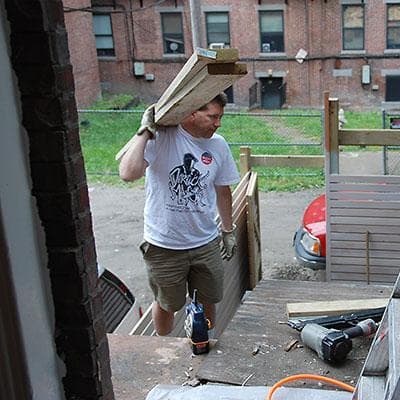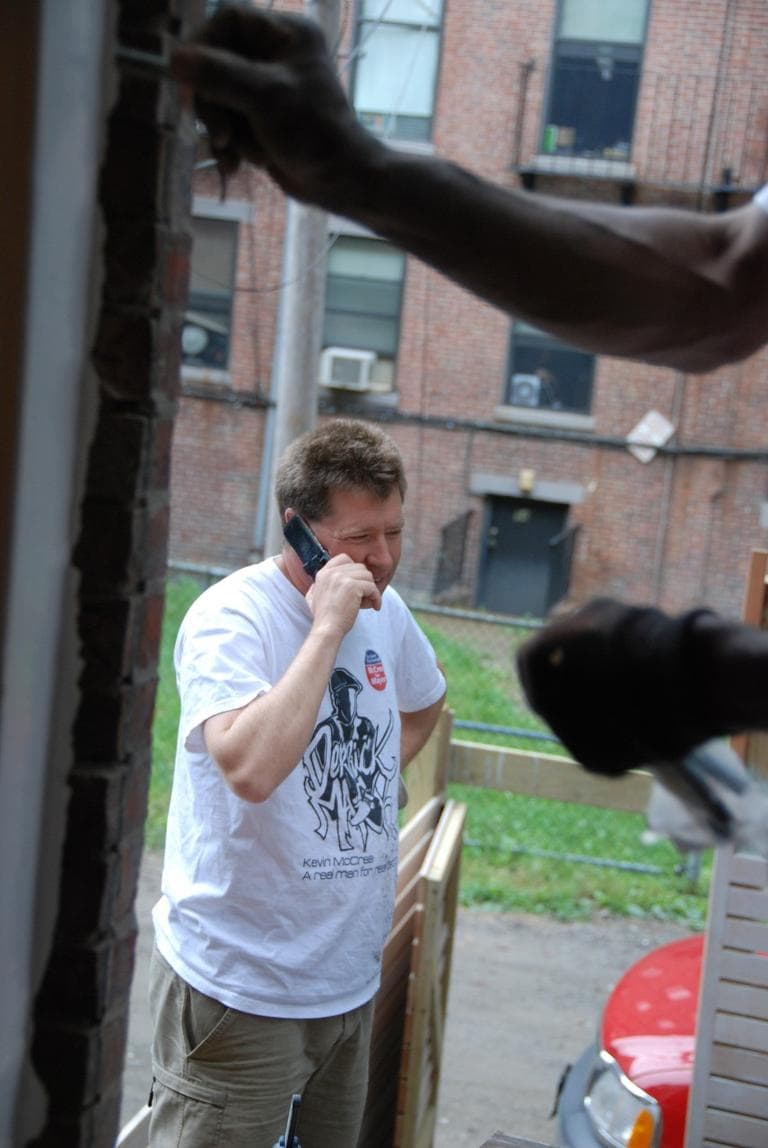Advertisement
The Mayoral Candidate You've Never Heard Of

It's been a wet summer. Not exactly the weather for knocking on doors and handing out fliers, especially when you're apt to be met with blank stares. Nevertheless, Boston's least known mayoral candidate is undeterred.
"I've been door knocking since January," says Kevin McCrea, opening the door of his white pick-up truck. He drops one leg out the door, then pulls back in.
"Do you have enough fliers?" asks his campaign manager, Antionetta Kelly.
"Yes. I just want to check these," McCrea says, glancing over the voter lists Kelly had put together in the morning. Kelly is a student at Smith College. The young, soft spoken woman is new to politics. So is McCrea. His is a low-frills campaign. Staff of one. Messaging through Gmail. Campaign headquarters run out of his kitchen. However, a failed 2005 run for city council has given him a feel for the machinery required of a more sophisticated city campaign.
As McCrea checks the canvassing lists, he sees that Kelly has arranged the houses in a straight numerical order.
"Next time we do these, it's better to split the odds and the evens," he says, "and that way we can walk down one side of the street and up the other."
Kelly nods and disappears around the corner at Centre Street in Roslindale.
"You know, I'm doing this, running for mayor, partially so that people like Antionetta can learn," McCrea says as he walks to the first house on the list. "Then, maybe one day she'll end up being mayor of Boston. Wouldn't that be amazing?"
Never mind the fact that McCrea freely admits it would be amazing if he won the mayoral primary. Most voters McCrea encounters — like the first Roslindale resident who opens the door — have no idea who he is.
"What are you, a newcomer here?" the resident asks.
"I’m a newcomer. I’m an outsider," McCrea replies. He pulls a flyer out from his clipboard and hands it to the man. The flyer says, “Kevin McCrea. Time for a change.”
Advertisement
"I’ve never heard your name before," the resident tells him.

McCrea owns Wabash Construction, a contracting company based in the South End. McCrea is a compact man, with red hair, a round face, a polite smile. His firm handshake makes him seem stalwart. His slightly stooped shoulders make him seem sincere. One thing you notice when you spend time with him: people relax around McCrea. They talk.
"The mayor don’t want to give up the job, I guess," the resident says.
"Ya think?" McCrea laughs. "Sometimes I think we’re only taking him out of there in a coffin."
"He’ll be tough to beat this time," the resident agrees. "But maybe next time you’ll have a better shot."
Canvassing with McCrea often goes like this. People have no clue who he is. He shares his story, then tosses out some sort of incendiary comment about Mayor Tom Menino.
“He's not doing things to make friends," says McCrea's friend, Steve Wintermeier. "It might be risky for a political career, but it's good for the city. He will come out and say what he thinks and what's on his mind. And you know, I don't think you have to go any further than his blog to see that. But again, he's not a politician."
Yet McCrea is running for political office, and casting himself as the anti-Menino outsider helps get his message heard. Every so often, he finds very receptive ears. At the middle of the block McCrea chances on an open door.
"How are you doing, sir?" he begins. "I'm Kevin McCrea. I'm running for mayor."
"Good," says the retiree at the door. "Anybody’s better than Dumbles."
McCrea nods his head as he circles this address on his clipboard. They talk for several minutes, and the retiree promises to give McCrea his "full consideration." For McCrea, that's a win. He strides up the street, shaking his head and smiling. "What did that guy call Menino? 'Dumbles'? Yeah, that's it. That's a great quote."
KEVIN McCREA WAS BORN IN BRIGHTON IN 1967. His mother is a third-generation Bostonian. His father grew up on a Midwestern farm, but moved to Massachusetts to attend MIT. The eldest of three children, McCrea says his childhood was pretty normal until he turned 10. His parents divorced and his mother moved the children up to Vermont. At 14, McCrea moved to Indiana to be with his father.
"My father picked me up at the airport and said, ‘by the way, I got remarried,'" McCrea recalls.
He expected to live with his father in Indianapolis. But instead, his dad drove him to a house his family owned in Columbus, Ohio.
"So I was actually living by myself when I was 14," McCrea says. "And he’d come back every couple of weeks or so and fill up the fridge with food and take me out to dinner and a movie, and say, ‘I’ll see you in two weeks.’"
Eventually, his father and step-mother reluctantly let him move in. He bounced around six different high schools in three years. It's a period in his life McCrea prefers not to talk about, except to say that it was "difficult," and that a Jesuit priest stepped in to mentor him through high school. That priest became one of McCrea's heroes, and the only one who didn't let him down.
McCrea's father, once his hero, had failed him. His other heroes, chess master Bobby Fischer and baseball player Pete Rose, failed him, too. Rose was banned from baseball. Fischer became a fugitive and an anti-Semite.
"You put heroes up on a pedestal. And, unfortunately, too often we're disappointed in them," McCrea says.
The pain of those failures has stayed with him. McCrea says he's been a watchdog against failure and disappointment — in both individuals and in government — ever since.
McCrea graduated from Wabash College in Indiana with degrees in physics and philosophy. The duality lingers in the way McCrea sees the world. Ask about falling voter turnout in Boston and McCrea will talk to you about his philosophy of a robust democratic ideal that requires an informed citizenry. When a member of the Young Democrats of Massachusetts asked McCrea to elaborate on his proposals to reform City Hall, McCrea said that government, as a system, should cohere more strictly to scientific principles of cause and effect.
McCrea put himself through college as a carpenter. He graduated, moved back to Boston — the place he calls his "real home" — and worked a stint as a high-altitude research physicist at Hanscomb Air Force Base. But McCrea wasn't making a lot of money contemplating the makings of nature and the nature of mankind. He returned to carpentry, and launched his historic renovations company, Wabash Construction, with an old college friend.
That led to his "big break": an early client was looking to launch a residential real-estate development firm and needed a contractor. They went into business together, with the development company hiring McCrea's Wabash construction firm for work on newly acquired properties.
Even though he complains that politics is "run by a bunch of rich white guys," the success of his two companies has made McCrea a rich white guy himself. The real-estate holdings put his net worth at several million dollars. Ten years ago, he bought a South End row house for $300,000. A gut rehab and a decade of sweat equity later, and the house is now valued at over $2.2 million.
Norris Joseph did most of the carpentry on McCrea's house. "He's got his ways, but he's a really good guy," Joseph says. "He's very strict on certain things, you know?"
Perhaps, at times, too strict. Especially when it comes to McCrea’s harsh critique of city government.
"Sometimes I talk to him about, you know, sometimes things don’t work well because there’s a compromise there," says his sister, Boston civil rights lawyer Meighan McCrea. "But a compromise doesn’t mean that a bad person got what they wanted. Sometimes, it’s two good people with competing interests that don’t mesh and each of them got something that they wanted. I thought he'd have a hard time understanding that."
McCREA SAYS HE GETS IT, but the watchdog in him never sleeps. The philosopher always broods. The scientist continually refines his observations.
On a recent trip to one of his job sites, McCrea interrupted our interview three times to point out what he saw as physical examples of city government failing Bostonians.
"I think people want a better government, and they know it's not efficient, but I don't think people think a lot about how you get to that point," he said as we drove down Tremont Street. He slowed as we passed a construction site near Northeastern University. "OK, what do you think the minority distribution is going to be on this job site here? I see one, two, three, four, five white guys, and what do you see?"
His campaign manager, Antionetta Kelly, quietly noted, "I see one black police officer."
"You can see at least visually that the jobs are not going to the typical residents of Roxbury," McCrea said. He flashed a grimace somewhere between pride that he had pointed out the work site's supposed inadequacy and disgust that he had to do so.
To McCrea, the ills and woes of City Hall can be solved with a strong dose of transparency. He points out that his opponents, City Councilors Sam Yoon and Michael Flaherty, also sound the clarion call for transparency. McCrea says he at least puts his money where his mouth is. Following his failed 2005 run for city council, McCrea sued the city council for violations of the state’s open meeting law. McCrea won. Then, set his sights on the mayor’s office.
"If you want to melt down what it is that I want to do at City Hall, it’s to make it transparent, so that the citizens can decide where they want to spend their money," McCrea says.
His "total transparency project," as he calls it, extends to the Boston Redevelopment Authority, which he would replace with a larger city planning office. McCrea would reform public education, as well, in part by ending busing.
But his reform-based platform, his desire to defeat Mayor Menino, even his belief that total transparency might re-engage Boston voters with their city government, none of these things explain why this “fringe” and “long-shot” candidate is really running for mayor. He isn't afraid to engage fully with the question.
"Do people want a reformer?" McCrea asks. "Or do they simply want a guy who will fix the potholes and make the schools work? I don't know." The difference, McCrea says, is immaterial. The point is, the power to fix schools and potholes resides, in McCrea's estimation, in the mayor's office.
So, then, how would this anti-political candidate run for mayor and not end up being like any other politician?
"The reason is, is because I don’t care," McCrea says. "I don’t need the power. I don’t want the power. I don’t care for the power. And there’s better people than me for running the city. My three opponents aren’t them. That’s the problem."
Then again, by McCrea's standards, hardly anyone would qualify. But that's why McCrea says he's running. He wants to inspire good people back into government, he says, as he shoulders a half dozen 2-by-4’s onto his truck.
McCrea tosses his gloves onto the dash and drives off to a job site. Then, it's a shower, a shave, a fresh suit, and another afternoon introducing himself as the protest candidate in a city that may, or may not, feel a similar need to protest.
This program aired on July 27, 2009.
